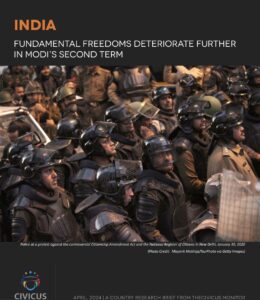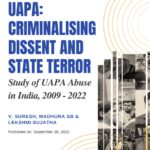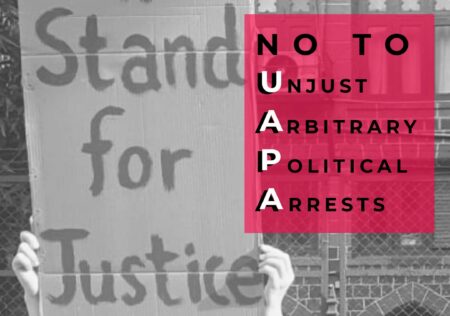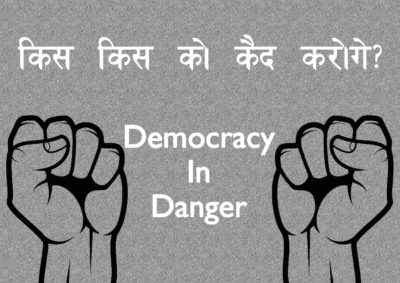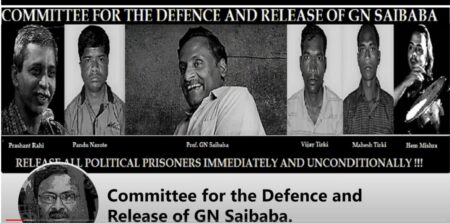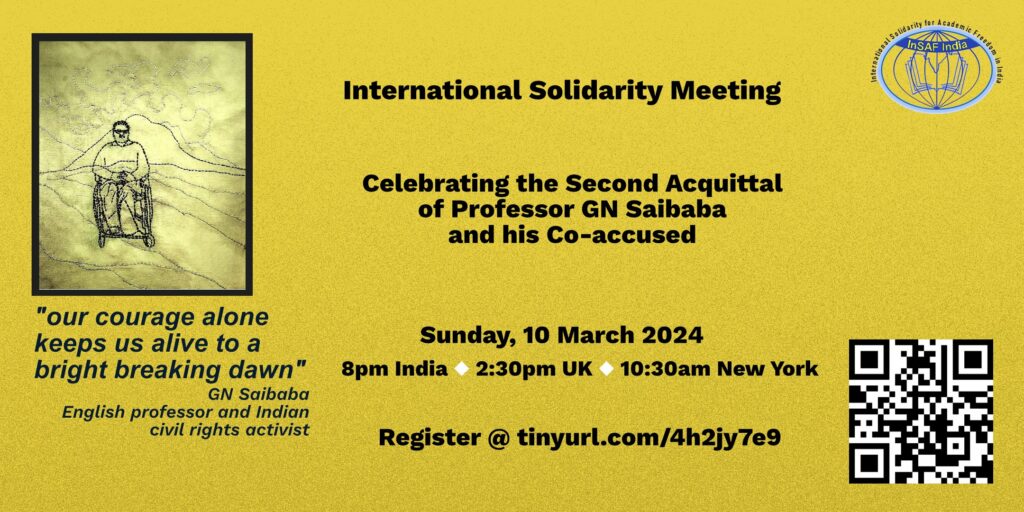 by Nihalsing / @Nihalsingrathod (March 7, 2024):
by Nihalsing / @Nihalsingrathod (March 7, 2024):
#GNSaibaba and #prashantrahi released
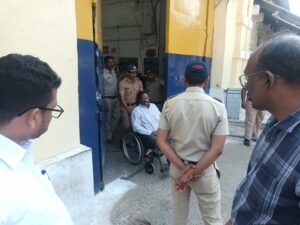
#hemmishra also released from Kolhapur jail
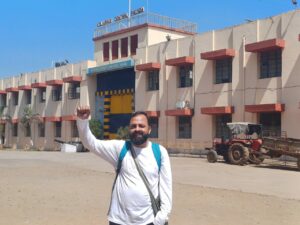
#prashantrahi with his daughter @shikharahi
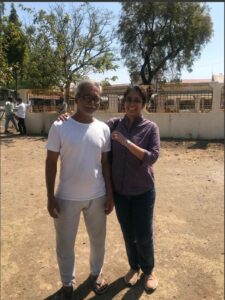
And finally #maheshtirki also walks out
Injustice And Impunity: How The Justice System Failed G.N. Saibaba
19/03/2024
Feminism India / by Hajara Najeeb
A professor of the Department of English at Ram Lal College in New Delhi, G.N. Saibaba was incarcerated under the draconian Unlawful Activities Prevention Act 1967, accusing him of having Maoist links
On March 8th, a frail G.N. Saibaba made his first public statement in ten years after a decade of torture and a lifetime of injustice. A professor of the Department of English at Ram Lal College in New Delhi, he was incarcerated under the draconian Unlawful Activities Prevention Act 1967, accusing him of having Maoist links.
Read more
“I Don’t Know How I Survived” Professor G. N. Saibaba says the reality of being free is yet to sink in
09/03/2024
The Citizen / by Nikita Jain
There was excitement and anticipation as former Delhi University Professor G. N. Saibaba entered the room in his wheelchair. Accompanied by his wife Vasantha Kumari, daughter, Communist Party of India (CPI) leader D. Raja amongst others, Prof. Saibaba smiled and waved at a few friends he recognised in the audience.
… Speaking about one his lawyers, Surendra Gadling, who himself is in jail for another case related to Elgar Parishad, Prof. Saibaba said that it was because of him that his case became stronger and it breaks his heart to see him behind bars. “Surendra Gadling is languishing behind the bars only for one reason, he stood for me and he argued most effectively in the sessions court during the trial.
Read more
It’s by chance I came out of prison alive: G N Saibaba after release from Nagpur jail
08/03/2024
Indian Express / by Express News Service
Saibaba also said he was “sad” that Surendra Gadling, his lawyer during the trial in the case, was behind bars in the Elgaar Parishad case.
Former Delhi University professor G N Saibaba, who had been sentenced to life imprisonment over his alleged Maoist links, was released from Nagpur Central Jail on Thursday morning, two days after his acquittal by the Nagpur bench of the Bombay High Court.
Read more
‘It Is Only by Chance That I Came Out of Prison Alive’: G.N. Saibaba
07/03/2024
The Wire / by Sukanya Shantha
“It is only by chance that I came out of prison alive,” 56-year-old former Delhi University professor S.N. Saibaba said in his first press briefing since his release from Nagpur Central jail on Thursday (March 7).
The Nagpur bench of the Bombay high court on March 5 acquitted him and five others on “terrorism” charges.
…
The trial in the lower court was handled by Nagpur-based human rights lawyer Surendra Gadling. Soon after the trial was completed in the Gadchiroli sessions court, Gadling was arrested in the Elgar Parishad case. Saibaba, on Thursday, said that his lawyer Gadling was targeted only for handling his case.
Read more
GN Saibaba’s long struggle for justice: Why the Bombay HC had to overturn his conviction – twice
09/03/2024
Scroll.in / by Vineet Bhalla
The former DU professor was arrested in 2014 and sentenced to life imprisonment in 2017. The High Court has now acquitted him, finding no evidence against him.
Human rights activist and former Delhi University professor GN Saibaba’s acquittal by the Bombay High Court for terror-related offences under the stringent Unlawful Activities (Prevention) Act on Tuesday and release from the Nagpur Central Jail on Thursday was the culmination of an arduous legal struggle.
Read more
Saibaba Acquittal: From Lack of Sanction to Dodgy Evidence, HC Judgment Tears Into State’s Case
06/03/2024
The Wire / by Sukanya Shantha
‘The prosecution has failed to establish the seizure of incriminating material from the house search of G.N. Saibaba,” the judges said. “The prosecution has also failed to prove the electronic evidence in terms of the provisions of the Indian Evidence Act, and the Information Technology Act.”
In its detailed judgment acquitting former Delhi University professor G.N. Saibaba and five others of ‘terrorism’ charges, the Nagpur bench of the Bombay high court has virtually shredded the state’s case against the six to pieces.
…
Saibaba’s lawyer jailed in Bhima Koregaon case
Incidentally, Saibaba’s defence in the trial court was handled by the Nagpur-based human rights lawyer Surendra Gadling, who, soon after the completion of trial, was himself arrested in the Elgar Parishad case.
Read more
Video: INTERNATIONAL SOLIDARITY MEETING
en | 1:07 min | 2024
By INTERNATIONAL SOLIDARITY FOR ACADEMIC FREEDOM IN INDIA (InSAF)
Celebrating the Second Acquittal of Professor GN Saibaba, Prashant Rahi, Mahesh Tirki, Hem Mishra and Vijay Tirki and the late Pandu Narote
Years in solitary confinement Years of shuttling from one bail plea to another Endless health ordeals, systematic discrimination The custodial death of 32-year old co-accused Pandu Narote The shocking overnight reversal of an acquittal order The life and trials of GN Saibaba and his co-accused remind us of the extent the repressive Indian state will go to in order to silence voices of dissent But on 7 March 2024, they finally walked free, after being acquitted for the second time on 5 March 2024, exonerated of all charges On 10 March 2024, we came together to celebrate this overdue step
We will not be silenced
Co-sponsored by
International Solidarity for Academic Freedom in India (InSAF India) South Asian Diaspora Action Collective (SADAC) Indian Workers Association (Great Britain) (IWA-GB) India Labour Solidarity (UK) Foundation The London Story The Humanism Project, Australia Hindus for Human Rights Free Saibaba Coalition (USA) Boston South Asian Coalition (BSAC) India Civil Watch International (ICWI) South Asia Solidarity Group, London
Watch video
Also read/watch:
▪Wives of Khalid Saifi, Hany Babu, GN Saibaba demand release of ‘political prisoners’ (Maktoob / Jan 2023)
▪ Bombay High Court Refuses Bail To DU Professor Hany Babu
(Live Law / Sep 2022)
Delhi University Professor Hany Babu mobilising rallies and co-ordinating the defence of convicted professor GN Saibaba was not just helping a fellow academic, but prima facie following a leftist handbook, the Bombay High Court said in its order refusing him bail.
Read more
▪ Video: Personal Liberty and the Indian Courts
25/10/2022
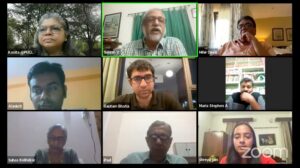
en | 1h 42min | 2022
The discussion examines the recent three judgements relating to
► The denial of bail of Jyoti Jagtap by the Bombay High Court in the Bhima Koregaon Conspiracy case.
► The stay on the Bombay High Court judgement of acquittal/discharge of Dr. GN Saibaba and others by the Supreme Court
► The denial of bail by the Delhi High Court of Umar Khalid in the Conspiracy case of the Delhi Riots of 2020.
Watch video (PUCL fb page)
▪ Rona Wilson’s iPhone Infected With Pegasus Spyware, Says New Forensic Report
(The Wire / Dec 2021)
Arsenal Consulting was engaged by Wilson’s defence lawyers to study the electronic evidence submitted against him in the Elgar Parishad case.
… Wilson, who was a core part of the 17- member Committee for Defence and Release of G. N. Saibaba, also received a message which said “Free Dr Saibaba and Oppose the suppression of Dissent in India. Please sign the petition here clicking [link]” on October 8, 2017.
Read more
▪ Surendra Gadling’s Computer Was Attacked, Incriminating Documents Planted: Arsenal Consulting (The Wire / July 2021)
